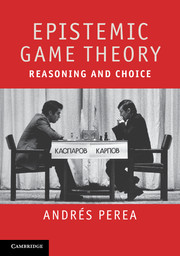Book contents
- Frontmatter
- Contents
- List of figures
- List of tables
- Acknowledgments
- 1 Introduction
- Part I Standard beliefs in static games
- 2 Belief in the opponents' rationality
- 3 Common belief in rationality
- 4 Simple belief hierarchies
- Part II Lexicographic beliefs in static games
- Part III Conditional beliefs in dynamic games
- Bibliography
- Index
4 - Simple belief hierarchies
Published online by Cambridge University Press: 05 July 2012
- Frontmatter
- Contents
- List of figures
- List of tables
- Acknowledgments
- 1 Introduction
- Part I Standard beliefs in static games
- 2 Belief in the opponents' rationality
- 3 Common belief in rationality
- 4 Simple belief hierarchies
- Part II Lexicographic beliefs in static games
- Part III Conditional beliefs in dynamic games
- Bibliography
- Index
Summary
Simple belief hierarchies
For many decades, game theory has been dominated by the concept of Nash equilibrium. In this chapter we will see that Nash equilibrium is obtained if we take common belief in rationality as the starting point and additionally impose conditions that go beyond the idea of common belief in rationality. We argue, however, that the additional conditions that are needed to arrive at Nash equilibrium are not very natural – in fact they are rather artificial. As a consequence, we believe that Nash equilibrium is not a very plausible concept to use when studying the reasoning processes of players in a game, even though Nash equilibrium has played a central role in game theory for many years. And this may in fact be the main message of this chapter. At the same time there is a very natural and basic alternative to Nash equilibrium – namely common belief in rationality – which does not suffer from these drawbacks.
In this chapter we will identify precisely those conditions that separate the concept of common belief in rationality – which we have studied in the previous two chapters – from the concept of Nash equilibrium. We will see that these conditions can be summarized by the concept of a simple belief hierarchy. As a first illustration of a simple belief hierarchy, let us consider the following example.
Example 4.1 Teaching a lesson
Suppose you are back at high school. During the biology class on Friday, the teacher tells you that you are very talented but that your grades could be much better if you would study more.
- Type
- Chapter
- Information
- Epistemic Game TheoryReasoning and Choice, pp. 134 - 184Publisher: Cambridge University PressPrint publication year: 2012



